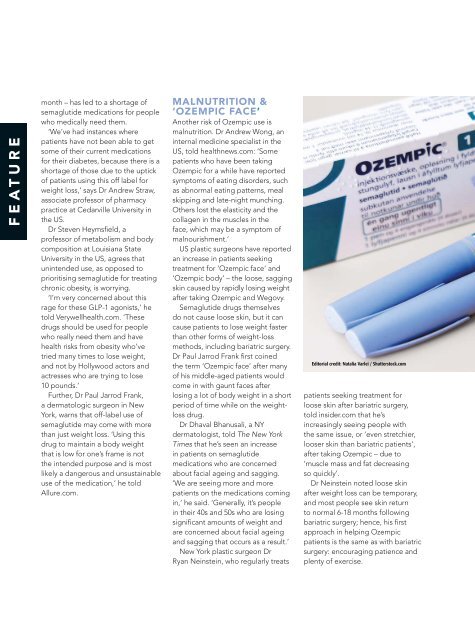CosBeauty Magazine #102
CosBeauty is the #BeautyAddict's guide to lifestyle, health and beauty. In this issue: - Face Tweakments - Get your glow on - Summer hair & skin essentials - Party survival guide
CosBeauty is the #BeautyAddict's guide to lifestyle, health and beauty.
In this issue:
- Face Tweakments
- Get your glow on
- Summer hair & skin essentials
- Party survival guide
Create successful ePaper yourself
Turn your PDF publications into a flip-book with our unique Google optimized e-Paper software.
FEATURE<br />
month – has led to a shortage of<br />
semaglutide medications for people<br />
who medically need them.<br />
‘We’ve had instances where<br />
patients have not been able to get<br />
some of their current medications<br />
for their diabetes, because there is a<br />
shortage of those due to the uptick<br />
of patients using this off label for<br />
weight loss,’ says Dr Andrew Straw,<br />
associate professor of pharmacy<br />
practice at Cedarville University in<br />
the US.<br />
Dr Steven Heymsfield, a<br />
professor of metabolism and body<br />
composition at Louisiana State<br />
University in the US, agrees that<br />
unintended use, as opposed to<br />
prioritising semaglutide for treating<br />
chronic obesity, is worrying.<br />
‘I’m very concerned about this<br />
rage for these GLP-1 agonists,’ he<br />
told Verywellhealth.com. ‘These<br />
drugs should be used for people<br />
who really need them and have<br />
health risks from obesity who’ve<br />
tried many times to lose weight,<br />
and not by Hollywood actors and<br />
actresses who are trying to lose<br />
10 pounds.’<br />
Further, Dr Paul Jarrod Frank,<br />
a dermatologic surgeon in New<br />
York, warns that off-label use of<br />
semaglutide may come with more<br />
than just weight loss. ‘Using this<br />
drug to maintain a body weight<br />
that is low for one’s frame is not<br />
the intended purpose and is most<br />
likely a dangerous and unsustainable<br />
use of the medication,’ he told<br />
Allure.com.<br />
MALNUTRITION &<br />
‘OZEMPIC FACE’<br />
Another risk of Ozempic use is<br />
malnutrition. Dr Andrew Wong, an<br />
internal medicine specialist in the<br />
US, told healthnews.com: ‘Some<br />
patients who have been taking<br />
Ozempic for a while have reported<br />
symptoms of eating disorders, such<br />
as abnormal eating patterns, meal<br />
skipping and late-night munching.<br />
Others lost the elasticity and the<br />
collagen in the muscles in the<br />
face, which may be a symptom of<br />
malnourishment.’<br />
US plastic surgeons have reported<br />
an increase in patients seeking<br />
treatment for ‘Ozempic face’ and<br />
‘Ozempic body’ – the loose, sagging<br />
skin caused by rapidly losing weight<br />
after taking Ozempic and Wegovy.<br />
Semaglutide drugs themselves<br />
do not cause loose skin, but it can<br />
cause patients to lose weight faster<br />
than other forms of weight-loss<br />
methods, including bariatric surgery.<br />
Dr Paul Jarrod Frank first coined<br />
the term ‘Ozempic face’ after many<br />
of his middle-aged patients would<br />
come in with gaunt faces after<br />
losing a lot of body weight in a short<br />
period of time while on the weightloss<br />
drug.<br />
Dr Dhaval Bhanusali, a NY<br />
dermatologist, told The New York<br />
Times that he’s seen an increase<br />
in patients on semaglutide<br />
medications who are concerned<br />
about facial ageing and sagging.<br />
‘We are seeing more and more<br />
patients on the medications coming<br />
in,’ he said. ‘Generally, it’s people<br />
in their 40s and 50s who are losing<br />
significant amounts of weight and<br />
are concerned about facial ageing<br />
and sagging that occurs as a result.’<br />
New York plastic surgeon Dr<br />
Ryan Neinstein, who regularly treats<br />
Editorial credit: Natalia Varlei / Shutterstock.com<br />
patients seeking treatment for<br />
loose skin after bariatric surgery,<br />
told insider.com that he’s<br />
increasingly seeing people with<br />
the same issue, or ‘even stretchier,<br />
looser skin than bariatric patients’,<br />
after taking Ozempic – due to<br />
‘muscle mass and fat decreasing<br />
so quickly’.<br />
Dr Neinstein noted loose skin<br />
after weight loss can be temporary,<br />
and most people see skin return<br />
to normal 6-18 months following<br />
bariatric surgery; hence, his first<br />
approach in helping Ozempic<br />
patients is the same as with bariatric<br />
surgery: encouraging patience and<br />
plenty of exercise.

















